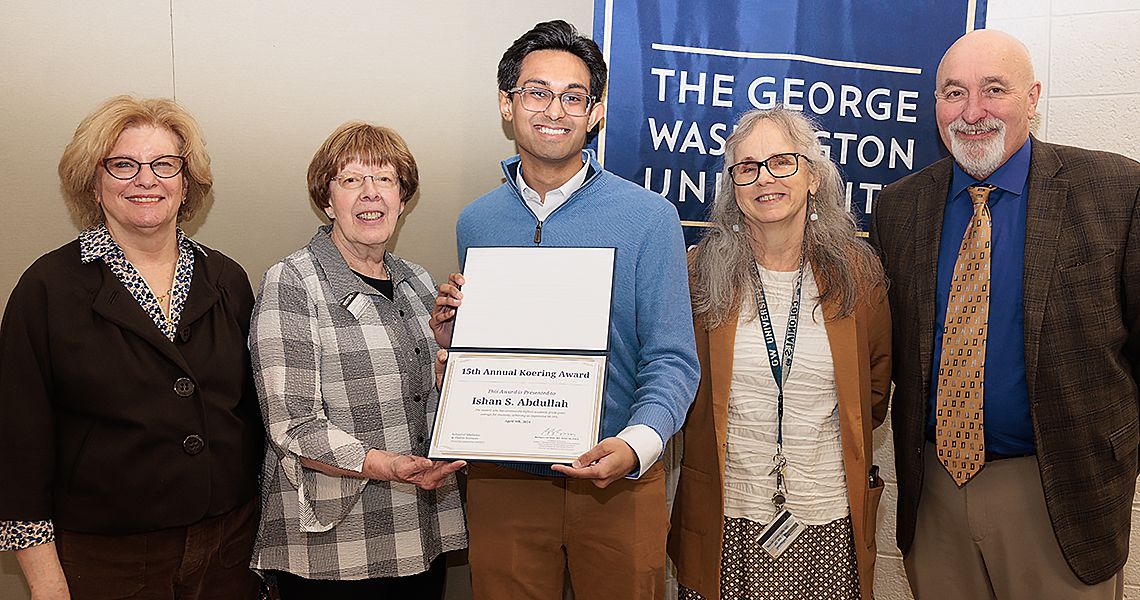On April 9, students and faculty at the George Washington University (GW) School of Medicine and Health Sciences (SMHS) gathered to honor the 15th Annual Marilyn J. Koering Award. This prestigious award recognizes the first-year medical student with the highest academic achievement in the anatomical sciences. This year, the award was presented to Ishan Abdullah, MSI, BS ’23.
Kenna Peusner, PhD, a professor of neurology and rehabilitation medicine at GW SMHS, led the event. She welcomed MaryAnn Stepp, PhD, professor of anatomy and cell biology, who paid tribute to Marilyn Koering’s legacy as a teacher and mentor. Joining them was John Bethea, PhD, King Fahd II Chair of Anatomy and Cell Biology, who addressed significance of the anatomical sciences in medical education.
“The anatomical sciences are the cornerstone of the medical sciences, from the dawn of medicine until today,” said Bethea. “Academic achievement is the cornerstone of everything we do here at GW. It permeates all medical disciplines and throughout the entire institution. For an individual to achieve the level of excellence that this year’s recipient has is truly remarkable.”
A specialist in microscopic anatomy, Marilyn J. Koering earned both her master’s degree and PhD at the University of Wisconsin before joining the GW SMHS faculty in 1969. She dedicated herself to teaching and research at GW until her retirement in 2003. Over her career, Koering was a principal investigator on numerous NIH-funded projects, with a focus on ovarian development, structure, and function.
Beyond her research, Koering was renowned for her compelling lectures — vividly illustrated, often using her own scanning electron microscopy images. Peusner recalled that Koering taught more than 5,000 medical students at GW, becoming a beloved figure who cared deeply about her students’ personal and professional growth. “She was a teacher who worked tirelessly to ensure her students would excel as physicians,” Peusner said.
Koering’s influence extended beyond the classroom and lab. After being diagnosed with malignant melanoma, she became a vocal advocate for patients in experimental treatment trials, joining an interferon therapy group at the Mayo Clinic. Despite her prognosis, she lived for over 20 years following her diagnosis, passing away in 2008.
“Marilyn fought against cancer with a tenacity that extended to her writing — through essays, television appearances, and correspondence with pharmaceutical companies and the federal government,” Peusner told the audience. “She was relentless in her pursuit of justice for patients participating in experimental treatments.”
In her remarks, Stepp shared a personal reflection on Koering’s mentorship. She recalled sneaking into the back of Koering’s histology class as a young researcher, hoping to keep up with the pace of her teaching.
“Marilyn was an extraordinary teacher. Her ability to make complex material accessible was unmatched,” Stepp recalled. “She taught me not only the technical aspects of histology but also how to carry those lessons into my own research.”
Stepp fondly remembered Koering’s simple but powerful teaching tool—a method to gauge scale while viewing histology slides. “Find a red blood cell,” Stepp explained, “and you can establish a ‘histologist’s ruler.’ Since red blood cells are about eight microns in diameter, they provide an intuitive point of reference for any slide.” Stepp continues to apply this technique in her own work. “It’s a small detail, but it’s invaluable. I use it almost every day in my research.”
As she has done for the past 15 years, Marilyn Koering’s sister, Susan Koering, traveled from Minnesota to attend the event. “I am so proud to see so many students pursuing careers in the medical field,” Susan Koering told the Class of 2027. “The recipients of this award have gone on to become leaders in radiology, emergency medicine, orthopaedic surgery, internal medicine—you name it. The impact you will make on your patients’ lives, and on the world, is immeasurable.”
Ishan Abdullah, the 2023 recipient, expressed his gratitude and awe upon receiving the award. “It is an incredible honor to be recognized in Marilyn Koering’s name,” Abdullah said. “Learning about her accomplishments as a professor, a physician, a researcher, and a sister has been inspiring. I hope to emulate the qualities she embodied in my own career as a physician.”



